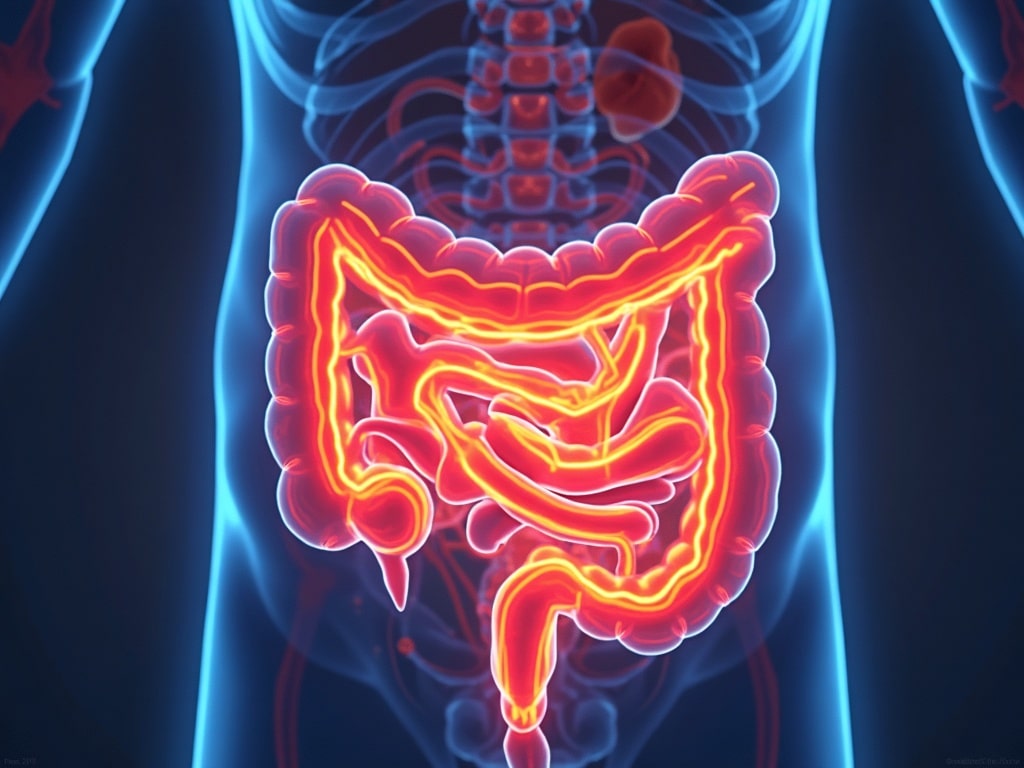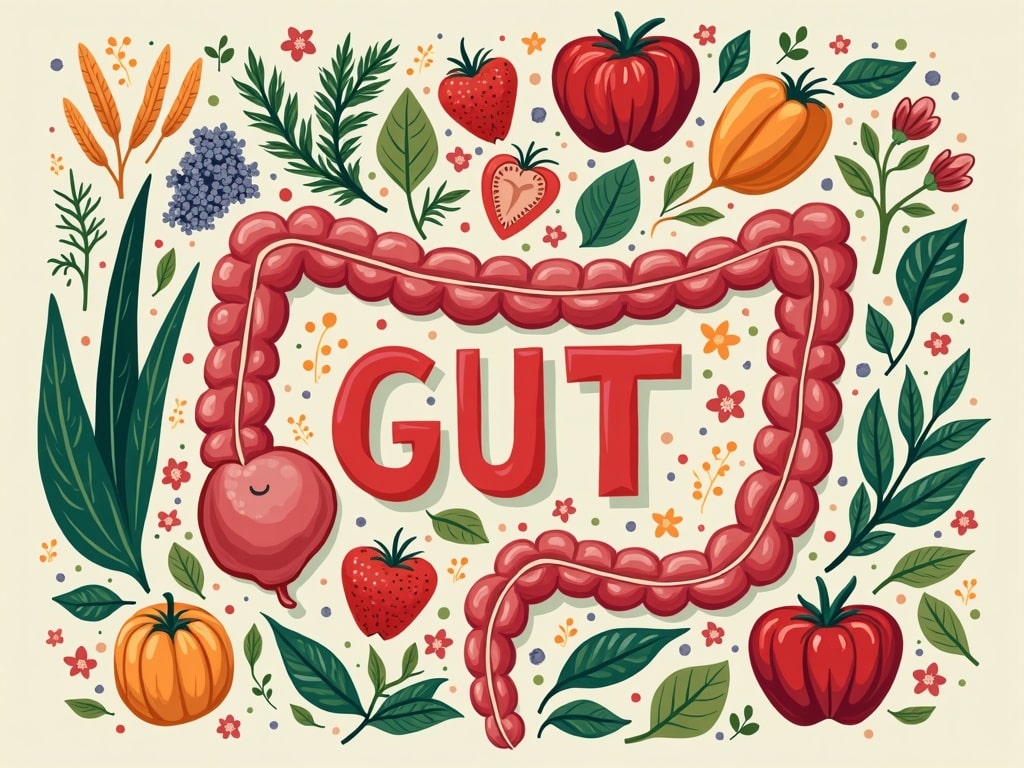How to Heal an Inflamed Gut: A Comprehensive Guide
Imagine your gut as a bustling city, constantly working to digest food, absorb nutrients, and keep harmful invaders at bay. Now, imagine that city under siege – riots in the streets, fires raging, and essential services disrupted. That's what an inflamed gut feels like: chaotic, uncomfortable, and potentially dangerous. But don't despair, healing is possible. This guide will provide you with a roadmap to calm the chaos and restore harmony to your inner city.
Understanding Gut Inflammation
Gut inflammation, or intestinal inflammation, isn't a disease itself, but rather a symptom of underlying issues. It indicates that the delicate balance within your digestive system has been disrupted. Think of it like the check engine light on your car – it signals that something isn't right and needs attention.
So, what causes this internal turmoil? Several factors can contribute to gut inflammation:
- Diet: Processed foods, sugary drinks, excessive alcohol, and food sensitivities (like gluten or dairy) can all irritate the gut lining.
- Stress: Chronic stress can wreak havoc on your gut microbiome and immune system, leading to inflammation.
- Infections: Bacterial, viral, or parasitic infections can trigger an inflammatory response.
- Medications: Certain medications, like antibiotics and NSAIDs (nonsteroidal anti-inflammatory drugs), can disrupt the gut's balance.
- Underlying Conditions: Conditions like inflammatory bowel disease (IBD), Crohn's disease, and ulcerative colitis are characterized by chronic gut inflammation.
Symptoms of Gut Inflammation
The symptoms of an inflamed gut can vary from mild discomfort to debilitating pain, and they can manifest differently in different people. Common signs include:
- Abdominal pain and cramping: This is often the most noticeable symptom.
- Bloating and gas: Excessive gas production and a feeling of fullness are common.
- Diarrhea or constipation: Changes in bowel habits are a hallmark of gut inflammation.
- Fatigue: Inflammation can drain your energy levels, leaving you feeling tired and sluggish.
- Nausea and vomiting: In severe cases, nausea and vomiting may occur.
- Weight loss: Unintentional weight loss can be a sign of malabsorption due to gut inflammation.
- Skin problems: Conditions like eczema and psoriasis can be linked to gut health.
If you experience these symptoms consistently, it's essential to consult a healthcare professional for proper diagnosis and treatment. Ignoring gut inflammation can lead to more serious health problems down the line.
The Gut-Healing Diet: Food as Medicine
One of the most powerful tools for healing an inflamed gut is your diet. By making strategic food choices, you can soothe the digestive system, reduce inflammation, and promote the growth of beneficial bacteria. Think of it as fertilizing your inner garden.
Foods to Embrace:
- Anti-inflammatory Foods: Load up on foods rich in antioxidants and anti-inflammatory compounds, such as:
- Fatty fish: Salmon, tuna, and mackerel are packed with omega-3 fatty acids.
- Leafy green vegetables: Spinach, kale, and collard greens are rich in vitamins, minerals, and fiber.
- Berries: Blueberries, strawberries, and raspberries are bursting with antioxidants.
- Nuts and seeds: Almonds, walnuts, chia seeds, and flax seeds provide healthy fats and fiber.
- Olive oil: Extra virgin olive oil is a healthy source of monounsaturated fats.
- Gut-Friendly Fiber: Fiber feeds the beneficial bacteria in your gut, promoting a healthy microbiome.
- Soluble fiber: Oats, apples, and beans help regulate blood sugar and promote regularity.
- Insoluble fiber: Whole grains, vegetables, and fruits add bulk to your stool and prevent constipation.
- Probiotic-Rich Foods: Probiotics are live microorganisms that can help restore balance to your gut microbiome.
- Yogurt: Choose plain, unsweetened yogurt with live and active cultures.
- Kefir: A fermented milk drink similar to yogurt but with a wider range of probiotics.
- Sauerkraut: Fermented cabbage that is rich in probiotics.
- Kimchi: A Korean staple made from fermented vegetables.
- Bone Broth: This nutrient-rich broth contains collagen, gelatin, and amino acids that can help heal the gut lining.
Foods to Avoid:
Certain foods can exacerbate gut inflammation and hinder the healing process. It's best to limit or eliminate these from your diet:
- Processed Foods: These are often high in sugar, unhealthy fats, and artificial additives, which can irritate the gut.
- Sugary Drinks: Soda, juice, and other sugary beverages can feed harmful bacteria and contribute to inflammation.
- Refined Carbohydrates: White bread, pasta, and pastries are low in fiber and can spike blood sugar levels.
- Excessive Alcohol: Alcohol can damage the gut lining and disrupt the microbiome.
- Artificial Sweeteners: These can alter the gut microbiome and contribute to inflammation.
- Common Allergens: Gluten, dairy, soy, and eggs are common allergens that can trigger inflammation in some people. Consider an elimination diet (under the guidance of a healthcare professional) to identify any sensitivities.
Sample Meal Plan for Gut Healing
Here's a sample meal plan to get you started on your gut-healing journey:
- Breakfast: Oatmeal with berries and nuts, or a smoothie with spinach, banana, and protein powder.
- Lunch: Salad with grilled salmon or chicken, or a lentil soup with whole-grain bread.
- Dinner: Baked chicken with roasted vegetables, or a stir-fry with brown rice and tofu.
- Snacks: Yogurt with fruit, a handful of nuts, or a hard-boiled egg.
Remember, consistency is key. Stick to your gut-healing diet as much as possible to give your body the best chance to repair and rebuild.

Lifestyle Changes for Gut Health
Diet is only one piece of the puzzle. Certain lifestyle changes can also significantly impact your gut health and reduce inflammation.
Stress Management
Chronic stress is a major trigger for gut inflammation. Finding healthy ways to manage stress is essential for healing your gut. Consider these techniques:
- Meditation: Even a few minutes of daily meditation can help calm the mind and reduce stress hormones.
- Yoga: Yoga combines physical postures, breathing exercises, and meditation, making it a powerful stress reliever.
- Deep Breathing Exercises: Simple deep breathing techniques can help activate the parasympathetic nervous system, which promotes relaxation.
- Spending Time in Nature: Studies have shown that spending time in nature can reduce stress and improve overall well-being.
- Hobbies: Engaging in activities you enjoy can help take your mind off stressors and boost your mood.
Prioritize Sleep
Sleep deprivation can disrupt the gut microbiome and increase inflammation. Aim for 7-9 hours of quality sleep per night. Create a relaxing bedtime routine to help you wind down, and make sure your bedroom is dark, quiet, and cool.
Regular Exercise
Regular physical activity can improve gut health by reducing inflammation, promoting a healthy microbiome, and improving bowel regularity. Aim for at least 30 minutes of moderate-intensity exercise most days of the week.
Hydration
Staying properly hydrated is crucial for digestive health. Water helps flush out toxins, lubricates the digestive tract, and promotes regular bowel movements. Aim to drink at least 8 glasses of water per day.
Supplements for Gut Healing
While diet and lifestyle changes are the foundation of gut healing, certain supplements can provide additional support.
Probiotics
As mentioned earlier, probiotics can help restore balance to the gut microbiome. Choose a high-quality probiotic supplement with a variety of strains.
L-Glutamine
This amino acid is a primary fuel source for the cells lining the gut. L-glutamine can help repair the gut lining and reduce inflammation.
Digestive Enzymes
Digestive enzymes can help break down food more efficiently, reducing the burden on the digestive system and easing symptoms like bloating and gas.
Omega-3 Fatty Acids
Omega-3 fatty acids have potent anti-inflammatory properties. Consider taking a fish oil supplement or consuming more fatty fish.
Herbal Remedies
Certain herbs, such as ginger, turmeric, and chamomile, have anti-inflammatory and soothing properties that can benefit gut health. However, always consult with a healthcare professional before taking any herbal supplements, especially if you are taking other medications.
When to Seek Professional Help
While many cases of gut inflammation can be managed with diet and lifestyle changes, it's important to seek professional help if:
- Your symptoms are severe or persistent.
- You experience blood in your stool.
- You have unexplained weight loss.
- You have a family history of inflammatory bowel disease.
A doctor can help diagnose the underlying cause of your gut inflammation and recommend appropriate treatment options. They may also recommend tests, such as a stool test or colonoscopy, to rule out more serious conditions.
The Road to Recovery
Healing an inflamed gut is a journey, not a destination. It requires patience, consistency, and a willingness to make lifestyle changes. By embracing a gut-healing diet, managing stress, prioritizing sleep, and considering supplements, you can soothe the chaos and restore harmony to your inner city. Remember to listen to your body, be kind to yourself, and celebrate your progress along the way. A healthy gut is within reach, and the benefits extend far beyond just your digestive system. It's an investment in your overall well-being, paving the way for a happier, healthier you.

